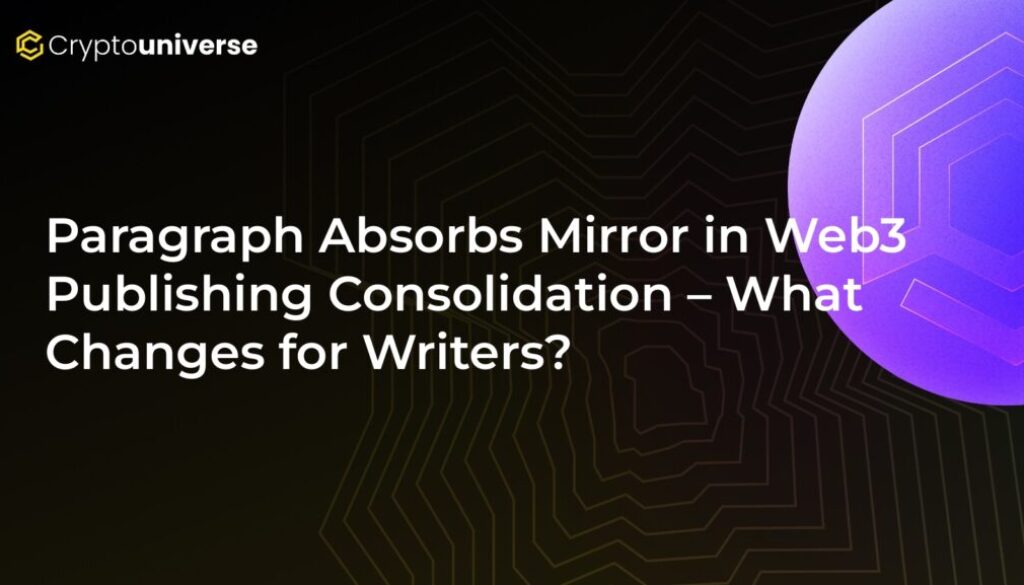Paragraph Absorbs Mirror in Web3 Publishing Consolidation – What Changes for Writers?

A Major Shift in the Web3 Publishing Landscape
The world of decentralized content creation is undergoing a significant transformation. Mirror.xyz, a pioneering Ethereum-based publishing tool, has announced it will be shutting down. However, this isn’t an ending but rather a consolidation. All of Mirror’s content and users are being migrated to Paragraph, creating a single, more powerful platform for Web3 writers and creators.
This move follows the acquisition of Mirror by Paragraph earlier in 2024 and a recent, impressive $5 million funding round for Paragraph led by industry giants like Union Square Ventures and Coinbase Ventures. So, what does this major consolidation mean for writers who built their homes on Mirror? Let’s dive into the details.
A Seamless and Automatic Transition for All Creators
The most pressing question for any Mirror user is: “What do I need to do?” The answer, reassuringly, is nothing at all.
The teams behind both platforms have engineered a completely seamless and automatic migration process. According to their joint announcement, the integration is designed to streamline the product roadmap and consolidate the underlying publishing infrastructure without any disruption to creators.
Here’s what you can expect:
- Automatic Redirection: Anyone visiting your old Mirror blog URL will be automatically redirected to your new blog on Paragraph. This means no broken links and no lost traffic.
- Complete Content Migration: All of your published posts, drafts, and media will be safely transferred over.
- Subscriber Data Intact: Your valuable list of subscribers will be migrated, ensuring you maintain your connection with your audience.
As the official statement confirms, “Your writing will remain live, and readers visiting your Mirror blog will be redirected to your new home on Paragraph.” This hands-off approach ensures that writers can continue focusing on what they do best: creating.
An Upgraded Toolkit: The Best of Both Worlds
This merger is more than just a change of address; it’s a significant upgrade for creators. Paragraph is now a powerhouse platform that combines the most innovative features from both its own and Mirror’s ecosystems. This provides writers with a supercharged toolkit for monetization, engagement, and community building.
Key Features Now Available on Paragraph:
- Reader Coins: This feature empowers your audience to directly support individual articles they find valuable. It’s a powerful way to monetize specific pieces of content.
- Writer Coins: For your most loyal fans, Writer Coins allow them to invest in you as a creator, supporting your entire body of work and long-term journey.
- The Remix Function: Fostering a more collaborative and dynamic environment, the remix function allows other users to publish responses that are directly linked to your original content. This creates a shared public dialogue and can even lead to shared revenue streams.
All of these tools are underpinned by blockchain technology, which handles attribution, access control, and revenue distribution with on-chain transparency and security.
The Bigger Picture: A Maturing Web3 Ecosystem
The news that
By joining forces, Paragraph and Mirror can eliminate redundant efforts, combine their active communities, and focus their resources on building a single, best-in-class product. This move positions Paragraph as the definitive leader in the crypto-native publishing sector and may signal a trend of similar consolidations across other Web3 services.
The Future is Bright for On-Chain Writers
While the shutdown of a beloved platform like Mirror may seem like a loss, this transition is ultimately a powerful step forward. For writers, it means a hassle-free migration to a more robust platform equipped with a superior set of tools for growing an audience and generating revenue.
The core promise of Web3 publishing—self-custody of content, direct monetization, and censorship resistance—is now championed by a stronger, unified platform. The future of on-chain writing is here, and it’s more promising than ever.


